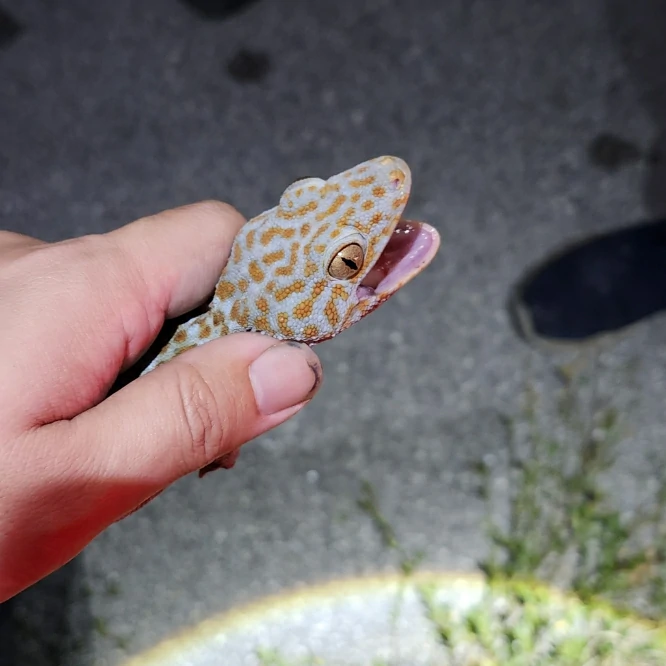Most lizards are completely silent, so if you hear your gecko making noise, it can be surprising. Unlike snakes, iguanas, and most other reptiles, geckos are actually pretty vocal. They use sound to talk to each other and to show how they’re feeling. So, what sounds do geckos make?
Geckos make all sorts of sounds: chirps, clicks, barks, squeaks, and even hisses. Different species have different abilities, but almost all geckos can make at least a few distinct noises. They use these sounds to mark territory, attract mates, and warn off threats.
Some sounds are quiet little clicks, while others are loud enough to wake you up at night.
Some geckos are chattier than others, and a few even mix sounds, like a chirp followed by a squeak, to get their message across.
Why Do Geckos Make Noise?
Geckos use sound in ways most other lizards don’t. While many lizards rely mostly on body language, geckos often back it up with noise to make their point clear.

The most common reason geckos make noise is to defend territory. Male geckos will call out to tell other males, “This area’s taken.”
These territorial calls can get pretty intense, sometimes turning into loud barks or repeated chirps to make sure rivals listen.
Geckos also make sounds during mating season. Males call to attract females, and sometimes females respond.
This back-and-forth helps them find each other in the dark and coordinate mating.
In some species, the timing and rhythm of these calls can show a male’s fitness, helping females pick the best partner.
The Chirping Sound
Many geckos make a chirping noise that sounds almost like a bird or insect. Male geckos often use chirps to warn other males to stay away.
Chirps are usually short, sharp, and easy to recognize even if you’re not familiar with geckos.
Chirps can be single notes or a series of repeated sounds. Some geckos chirp so regularly it almost sounds like singing.
House geckos, the little ones that live near homes in tropical areas, chirp frequently.
Leopard geckos chirp too, but not as often. Some house geckos even form a chorus at night when multiple geckos call together.
Clicking and Squeaking Sounds
Clicks and squeaks are shorter, sharper noises than chirps. Geckos make these sounds for different reasons, from mild annoyance to fear.
You might hear a gecko click if you pick it up or disturb it while it’s resting. It’s a polite way of saying, “I don’t like this.”
In the wild, clicks can help geckos signal to others nearby without attracting predators.
Squeaks happen when geckos feel scared or threatened. Baby geckos squeak more often than adults because they feel vulnerable.
Adults can squeak too, usually when startled.
Barking: The Loudest Gecko Sound
Some geckos can bark, and it’s surprisingly loud for a small animal. Tokay geckos are famous for their barking calls that sound like “tokay” or “gecko”, which is actually how they got their name.
A tokay gecko’s bark can be heard from far away and often surprises people who aren’t expecting such a big sound from a little lizard.

In the wild, it helps males claim territory and attract females.
Barking is usually a warning or a mating call, and males can keep it up for hours at night during breeding season.
If you’re thinking about a tokay gecko as a pet, be ready for noise, it’s almost like having a tiny dog in your room.
Hissing and Defensive Sounds
When a gecko feels threatened and can’t escape, it might hiss. Hissing is meant to make the gecko seem bigger and scarier than it really is.
The hiss often comes with an open mouth or even a small lunge. Some geckos combine hissing with tail movements or puffing up to make the bluff more convincing.
Crested geckos sometimes hiss softly when startled or uncomfortable. It’s much quieter than a snake hiss, but it still says, “Back off.”
How Do Geckos Produce Sounds?
Geckos make sounds using their vocal cords, similar to humans. Air passes through the larynx and vibrates to create noise.
Geckos can adjust these vibrations to make different pitches and patterns. The sounds are then amplified by the mouth and throat.

Some species even have special vocal sacs or chambers that make their calls louder or more distinct.
Species that rely on calling for communication tend to have more complex vocal structures, like tokay geckos with their loud barks. Quieter species, like leopard geckos, have simpler systems.
Which Gecko Species Are Most Vocal?
Tokay geckos are probably the loudest of all geckos. House geckos are also very vocal, especially at night in tropical areas.
Mediterranean geckos chirp and click but aren’t as loud. Leopard geckos are on the quieter side; they chirp or squeak occasionally but aren’t constantly noisy.

Even within a species, individual geckos can be more or less talkative. Males usually make more noise than females, except when females are uncomfortable or mating.
What It Means When Your Pet Gecko Makes Noise
If your pet gecko makes sounds, it’s trying to tell you something.
-
Chirping usually isn’t a problem. It’s normal territorial or mating behavior.
-
Clicking or squeaking during handling means the gecko wants space. Handling gently or less often can reduce these sounds.
-
Hissing is a clear warning that your gecko feels threatened. Give it space to calm down.
Geckos That Don’t Make Much Sound
Not all geckos are talkative. Gargoyle geckos are usually quiet, and day geckos are mostly silent too.
Quiet geckos can surprise you occasionally, especially males during mating season.
Even “silent” species may click or chirp sometimes.
Night Sounds and When Geckos Are Most Vocal
Geckos are mostly active at night. That’s when they hunt, defend territory, and look for mates. Pet geckos may make noises during the night, it’s completely normal.
Constant stressed sounds, like repeated hissing or squeaking, could indicate something is wrong in the enclosure, like wrong temperature or lack of hiding spots.
Checking their environment regularly helps you tell normal sounds from stress signals.
The Science of Gecko Sounds
Researchers study gecko calls to understand how they communicate and how this behavior evolved.
Gecko calls can be complex, and some species can even recognize individual geckos by their calls.
Females can sometimes tell familiar males from strangers, which helps them avoid mating with relatives.
Studying these sounds also gives clues about gecko evolution. Species that are closely related often have similar call patterns, which helps scientists figure out their ancestry.
Conclusion
Geckos are some of the most vocal lizards in the world, making everything from quiet clicks to loud barks. These sounds help them communicate about territory, mating, and danger.
If you have a pet gecko, paying attention to the sounds it makes can tell you how it’s feeling. Occasional chirping is normal, but constant distress calls might mean something needs to be fixed in its environment.
Whether you find it charming or annoying, a gecko’s vocalizations are a natural and important part of how these little lizards interact with the world.
That chirping gecko in your home or terrarium is just doing what millions of years of evolution programmed it to do.
Hi, my name is Ezra Mushala, i have been interested animals all my life. I am the main author and editor here at snakeinformer.com.

